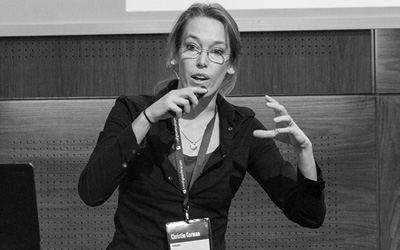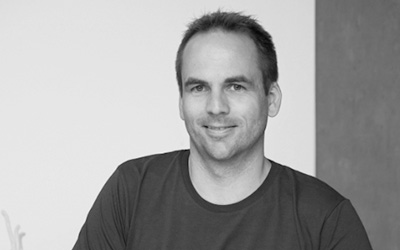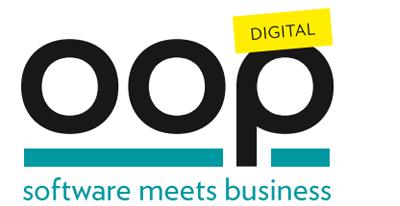Keynotes
2023 wird es wieder einen Blick über den Tellerrand mit unseren spannenden Keynotes geben!

Keynote 07.02. : Schluss mit den digitalen Menschenrechtsverletzungen! Oder: Sind wir nicht alle ein bisschen behindert?
Peggy Reuter-Heinrich
Auch im digitalen Leben gilt das Menschenrecht auf Teilhabe. Durch Hindernisse bei digitalen Lösungen werden Nutzer oft erst zu Behinderten gemacht. Das muss sich dringend ändern! Die öffentliche Hand ist längst verpflichtet, digitale Teilhabe durch Barrierefreiheit sicherzustellen. Ab 2025 gilt dies auch für die Privatwirtschaft. Empathisch setzt Peggy Reuter-Heinrich Impulse und inspiriert zum Mitwirken. Ziel der Expertin ist, den entscheidenden Wandel beim Publikum anzustoßen. Nach diesem Vortrag werden auch Sie zum überzeugten Mitgestalter digitaler Inklusion.
Peggy Reuter-Heinrich ist IT-Unternehmerin, UX-Designerin und Expertin für digitale Barrierefreiheit. Mit jahrzehntelanger Erfahrung aus über 500 Design-Lösungen, über 100 IT-Projekten und über 2.000 Trainings-Stunden weiß sie, was die Nutzer digitaler Lösungen wirklich brauchen und wollen. Nun strebt die mit einigen Awards geehrte UX-Designerin nach der höchsten Form von UX – nämlich sozial verantwortungsvolle Nutzer-Erlebnisse, welche die Teilhabe aller Menschen an der Digitalisierung ermöglicht. Ihre Mission einer menschenfreundlichen IT-Welt und ihr Wissen teilt Peggy in Büchern, Videos, Vorträgen, Schulungen und Beratungen. Mit Passion und Profession setzt sie sich für soziale Gerechtigkeit und Barrierefreiheit in der digitalen Welt ein. Das tut sie auch als Gründerin einer gemeinnützigen GmbH, die mittels IT hilft. Alles in allem inspiriert sie mit dem femininen Charme einer „Women in Tech“ andere Menschen zum Mitfühlen, Nachdenken, aber insbesondere zum Handeln.
© Fotografierte Person: Peggy Reuter-Heinrich
© Fotograf: Dominik Pfau

Keynote 08.02. : Cloud Adoption Patterns
Lynn Langit
Learn key patterns, practices, tools and techniques which lead to successful cloud adoption. Lynn's work with research teams around genomic-scale data pipelines for human health will be highlighted in this keynote.
Independent Cloud Architect and Developer, Lynn is also the author of 35 cloud courses on Linked In Learning. She publishes GitHub (code) and Substack (articles).
https://github.com/lynnlangit
https://lynnlangit.substack.com/

Keynote 09.02. : Making sure the new platform is actually an improvement.
Christin Gornan
Since the dawn of software development, programmers have been perpetually occupied with migrating our "legacy" code to "the new platform". As soon as we finish, it is obsolete, and we need to start over. Today we are typically in the midst of moving to the cloud. We need DevOps, microservices, new frontend frameworks... there is always some new tool that promises to deliver much better value than our existing solutions. Millions - even billions - are spent on these initiatives. Are they worth it? For whom?
In this presentation we will go through various strategies and their tradeoffs. How can we work with our code bases, staff and users to maximise the actual value delivered? The answer will depend on many things. Be conscious of what exactly you are aiming to achieve.
Christin Gorman has more than 20 years experience with hands-on software development. She is currently working on a large migration project in the Norwegian healthcare sector. She has worked for both startups and large enterprises, on systems varying from real-time control systems, to e-commerce. What is important in one field is not necessarily important in others. Both in writing and in presentations, she is known for her entertaining way of raising questions about established truths, and making people think about why they are working the way they do. Sometimes controversial, but never boring.
© Fotograf: Chris Searle

Keynote 09.02. : Swarms for People
Sabine Hauert
As tiny robots become individually more sophisticated, and larger robots easier to mass produce, a breakdown of conventional disciplinary silos is enabling swarm engineering to be adopted across scales and applications, from nanomedicine to treat cancer, to cm-sized robots for large-scale environmental monitoring or intralogistics. This convergence of capabilities is facilitating the transfer of lessons learned from one scale to the other.
Larger robots that work in the 1000s may operate in a way similar to reaction-diffusion systems at the nanoscale, while sophisticated microrobots may have individual capabilities that allow them to achieve swarm behaviour reminiscent of larger robots with memory, computation, and communication. Although the physics of these systems are fundamentally different, much of their emergent swarm behaviours can be abstracted to their ability to move and react to their local environment.
This presents an opportunity to build a unified framework for the engineering of swarms across scales that makes use of machine learning to automatically discover suitable agent designs and behaviours, digital twins to seamlessly move between the digital and physical world, and user studies to explore how to make swarms safe and trustworthy. Such a framework would push the envelope of swarm capabilities, towards making swarms for people.

Keynote 07.02. : Die fünf wichtigsten Anwendungsfälle und Architekturen für Data in Motion im Jahr 2023
Kai Wähner
Über Daten-Streaming und Apache Kafka redet die Welt. Kai Waehner, Field CTO bei Confluent, stellt uns in dieser Keynote die Prognosen für die fünf wichtigsten Use Cases und Architekturen in diesem Bereich für 2023 vor und welche Trends er bei Kunden industrieübergreifend feststellen konnte: Dezentraler Data Mesh: Fokussierung auf den Geschäftswert durch den Aufbau von Datenprodukten in unabhängigen Domänen mit verschiedenen Technologien. Cloud-natives Lakehouse: Anwendung einer Best-of-Breed-Unternehmensarchitektur für Echtzeit- und Batch-Datenanalysen mit dem richtigen Tool für jede Aufgabe (z.B. Databricks, Elastic, BigQuery, etc.). Daten-Sharing: Zusammenarbeit innerhalb und außerhalb des Unternehmens durch die gemeinsame Nutzung von Daten über offene APIs, Austausch von Streaming-Daten und Cluster Linking. Verbesserte Benutzerfreundlichkeit: Schnellere Markteinführung und einfachere Wartung durch bessere Entwicklertools, die verschiedene Personengruppen wie Entwickler, Citizen Integrators und Data Scientists unterstützen. Erweiterte Data Governance: Compliance und Datenschutz über alle Datenströme hinweg mit Data Lineage, Event Tracing, Policy Management und dem "Zurückdrehen" der Zeit zur retrospektiven Analyse von Events.
Kai Wähner ist Field CTO bei Confluent. Er arbeitet mit Kunden auf der ganzen Welt und mit internen Teams wie Engineering und Marketing zusammen. Kais Hauptfachgebiet liegt in den Bereichen Data Streaming, Analytics, Hybrid Cloud Architekturen, Internet of Things und Blockchain. Kai ist regelmäßiger Sprecher auf internationalen Konferenzen, schreibt Artikel für Fachzeitschriften und teilt seine Erfahrungen mit neuen Technologien auf seinem Blog.

Keynote 08.02. : Our Ever-Changing Compute-World Made Simpler, Safer, Accessible, and Even Profitable
Guy Tamir, Walter Riviera, Carsten Schuckmann
- The race for performance and the variety of specialized workloads drives the industry to build more parallel, more heterogenous (multi accelerator), and distributed computing systems.
- These systems introduce programming challenges and barriers of entry to developers.
- Software solutions can make technologies like AI accessible, safer and easier to use by wider communities.
- We will present some of the driving forces, world trends, challenges, and emerging solutions such as oneAPI, AI reference Kits, federated learning and more and demonstrate how SW can be made simpler, safer, and more profitable.
Guy Tamir is a technology evangelist at Intel Software and Advanced Technology group. His main areas of interest and expertise are Artificial Intelligence, Computer vision, Video processing, and Heterogeneous, multi-accelerator parallel computing. In addition, Guy is an active YouTuber with the OpenVINO and oneAPI video channel that just passed 3 million viewers recently. Guy holds an M.Sc. (EE, Technion) and MBA (Open University). Channel link: https://youtube.com/playlist?list=PLg-UKERBljNxsCltpcXU_Haz9xQSCN_SB
Walter Riviera is AI Technical Specialist EMEA Lead at Intel.
Walter joined Intel in 2017 as an AI TSS (Technical Solution Specialist) covering EMEA and he’s now playing an active role on most of the AI project engagements within the Data Centers business in Europe. He is responsible for increasing Technical and business awareness regarding the Intel AI Offer, enabling and provide technical support to end user customers, ISVs, OEMs, Partners in implementing HPC and/or Clouds solutions for AI based on Intel’s products and technologies. Before joining Intel Walter has collected research experiences working on adopting ML techniques to enhance images retrieval algorithms for robotic applications, conducting sensitive data analysis in a start-up environment and developing software for Text To Speech applications.
Carsten Schuckmann is part of Accenture’s Cloud First Applied Intelligence group, who strives to help Accenture clients implement transformative cloud-first offerings, leading with a focus on technical innovations and TCO optimization. Carsten’s key focus is to enable growth across EMEA clients in cloud adoption and AI innovation through thought leadership.
Carsten works closely with Intel and other key ecosystems partners and providers to bring optimization solutions and technology recommendations to Accenture’s clients across various industries.

